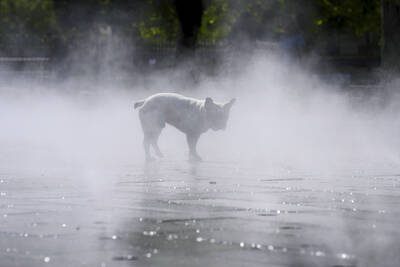Two years ago, Public Radio sounded good. They were a solid, danceable expat rock ’n’ roll band. Then something happened, maybe the “revolution” prophesied on their MySpace, where bands will sprout “like wild fire” and will play “more recklessly, free and unattached to doubt than ever before.”
The revolution they describe reads like a self-description: “raw, experimental, creative, hungry and eager.”
Public Radio has become a band that maintains a unified sound while experimenting with various genres. Says bass player Thomas Squires in an interview with the band on Monday: “It’s not like any of us listen to the same albums, we all come from different places, but it just works.”

Photo: Alita Rickards
Guitarist and vocalist Nathan Javens said they have become more confident and more adventurous. This can be heard in a pure punk track he wrote called Manwhore, which has elements of the Descendants in the humorous lyrics backed up by angry, heavy punk: You think you’re fucking cool getting laid in Taiwan?/ Zero to hero/ Manwhore!!
Moshe Foster, who also plays guitar, sings, and writes the lyrics for many of the band’s songs, calls their sound “kaleidoscopic.” Drummer Dan Plimmer suggests “adventurous rock.” After some debate they agree on “kaleidoscopic adventure rock,” though Squires says sternly that “nobody is comfortable with fitting into a pigeon hole”.
He’s right. How do you peg a band that seamlessly moves from reggae to punk to a narcotic Mexican Folk song like Narcos Corridos?
A large part of their live set is also devoted to hypnotic, psychedelic jams that keep audiences in the state Foster prefers: “dancing or being quiet. If they aren’t dancing, and are talking, you have to think you’re not connecting with your audience.”
Foster’s songs tend to emphasize the music. He’ll “hear a melody and will go home and figure it out” before bringing it to the studio, while Javens says “90 percent of the time I sit down and write all the words and I find the meter it works in and the key to sing it in after.”
They are committed, says Javens, to being “as artistically expressive as [we] can without having to cater to the audience. We’ve established ourselves long enough that we have the freedom to do what we want and keep our artistic integrity and be happy with our own music.”
They have also reached a point where, though they appreciate unique shows like the opening party for Urban Nomad at the historic Paris Night Club (夜巴黎舞廳) or music festivals like the upcoming Peacefest and would like to spend more time in the studio instead of doing so many live gigs in bars.
“I’d like to record an album that I’d never get bored listening to,” says Foster. Squires agrees: “It’s not necessarily so rewarding playing songs again and again as it is to go home and come up with something new.” It’s easy to tell they work well together by watching the way they banter and add to each other’s thoughts during our interview. An idea will come up and each member will add to the theme, with Plimmer nodding rhythmically in agreement.
They are thrilled to be playing tomorrow at the Paris Night Club, and Foster becomes animated describing it: “It’s this 50-year-old nightclub, totally retro place, huge dance floor, bigger than Luxy’s, with a super old, funky, perfectly working hi-fi stereo.”
Squires says Rabbit is Rich (兔子很有錢), also playing at the event, is “by far and away the coolest band I’ve seen in the last year.” They have a sound that is reminiscent of L7 and the Yeah Yeah Yeahs. Lead singer Andrea Huang (黃盈誼) freaks out on stage, and throws her massive mop of hair around her tiny head, singing in a pop/punk style that’s half sweetness and half screaming with simple lyrics in English. Guitarist Ethan Fang (方奕勝) rips out choppy, catchy riffs, while Adam Kuo (郭漢威) on bass and drummer Roxy Lin (林志軒) pound out heavy, wiggly beats.
“Their energy and attitude makes them seem refreshing and original,” says Foster. “They’re really young but have a very mature energy.”
Rounding out the night will be Taimaica Soundsystem, a reggae dub band.
Mixing genres is what Public Radio is all about, anyway. The band used to be called The Richard Pryor Experience, but, Foster says, “We all came up with Public Radio. It’s full of different stations and it’s free.”

Has the Taiwan People’s Party (TPP) changed under the leadership of Huang Kuo-chang (黃國昌)? In tone and messaging, it obviously has, but this is largely driven by events over the past year. How much is surface noise, and how much is substance? How differently party founder Ko Wen-je (柯文哲) would have handled these events is impossible to determine because the biggest event was Ko’s own arrest on multiple corruption charges and being jailed incommunicado. To understand the similarities and differences that may be evolving in the Huang era, we must first understand Ko’s TPP. ELECTORAL STRATEGY The party’s strategy under Ko was

It’s Aug. 8, Father’s Day in Taiwan. I asked a Chinese chatbot a simple question: “How is Father’s Day celebrated in Taiwan and China?” The answer was as ideological as it was unexpected. The AI said Taiwan is “a region” (地區) and “a province of China” (中國的省份). It then adopted the collective pronoun “we” to praise the holiday in the voice of the “Chinese government,” saying Father’s Day aligns with “core socialist values” of the “Chinese nation.” The chatbot was DeepSeek, the fastest growing app ever to reach 100 million users (in seven days!) and one of the world’s most advanced and

It turns out many Americans aren’t great at identifying which personal decisions contribute most to climate change. A study recently published by the National Academy of Sciences found that when asked to rank actions, such as swapping a car that uses gasoline for an electric one, carpooling or reducing food waste, participants weren’t very accurate when assessing how much those actions contributed to climate change, which is caused mostly by the release of greenhouse gases that happen when fuels like gasoline, oil and coal are burned. “People over-assign impact to actually pretty low-impact actions such as recycling, and underestimate the actual carbon

An internal Meta Platforms document detailing policies on chatbot behavior has permitted the company’s artificial intelligence creations to “engage a child in conversations that are romantic or sensual,” generate false medical information and help users argue that Black people are “dumber than white people.” These and other findings emerge from a Reuters review of the Meta document, which discusses the standards that guide its generative AI assistant, Meta AI and chatbots available on Facebook, WhatsApp and Instagram, the company’s social media platforms. Meta confirmed the document’s authenticity, but said that after receiving questions earlier this month, the company removed portions which stated